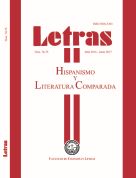Juegos de sinonimia en el Quijote : una intersección entre la narrativa de ficción y la historia de la traducción
Keywords:
Don Quixote, Parody of Translation, Techniques and Strategies, Translation History, History of the NovelAbstract
It is well known that the Quijote presents itself as a translation (the supposed translation of Arab historian Cide Hamete Benengueli’s chronicle, performed by a moorish interpreter, and re-elaborated by a "second author" into its final form as a Castilian narrative). Nevertheless, critics have tended to see this game as a mere consequence of Cervantes’s parody of chivalric romances, which very often presented themselves as supposed translations. The present article proposes that, in fact, Cervantes is parodying very specific translation practices and strategies that had been used in Spain in the past and that involved such aspects as collaboration among translators from different cultures, linguistic multiplicity, and the possibility that different reading positions could coexist on a the same text. The value of considering the specificity of Cervantes’s parody lies in the possibility of rescuing these aspects as objects of the critical and meta-fictional reflection that Cervantes proposes in the Quijote.Downloads
Download data is not yet available.
Downloads
Published
2019-04-16
How to Cite
Bistué, B. (2019). Juegos de sinonimia en el Quijote : una intersección entre la narrativa de ficción y la historia de la traducción. Letras, (74-75), 29–49. Retrieved from https://e-revistas.uca.edu.ar/index.php/LET/article/view/1694
Issue
Section
Artículos
License












